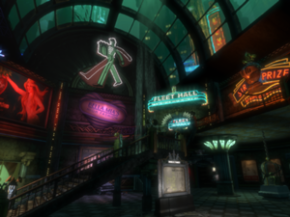Journal of Josiah Young, Citizen of Rapture
January 19th, 1951.
Man oh man, this place is wild! Even the atrium when you first come in is surreal. Heck, it’s all surreal. The lights, the sounds, the people. I’ve never seen anything like it before. All my years, I never imagined I’d see a city built underwater, and a glorious one at that. That Kashmir restaurant looks mighty fine. I don’t think Kate and I will ever be able to afford it. But, you gotta have something to look forward to.
Our apartment is small, but I like to think of it as cozy. We have everything we need. And I know we’ll be happy here. Not sure what we are going to do for work but from everything I know about the economy here, I think we’ll be able to find something.
Basically, I’m just excited to have a fresh start. I didn’t want to end up one of those GIs who sold car insurance for the rest of his days. I fought hard in the war. I think I deserve better than an average life. Kate and I are going to do something special here. I know it.
Speaking of Kate, she and I loved Fort Frolic. What a place! World class art and theater, though I guess I never really seen world class art or theater but that’s what I bet it looks like!
I gotta say, this place is something else.
August 31st, 1952.
Damn rich people, running everyone out of business! Kate and I were doing just fine a few months ago with our little clothing shop and one of those damn elites decided they were going to open a huge store right next door selling shirts for just a little less. And of course, people looking for the best deal didn’t want OUR shirts anymore. Makes me sick. You got the money, you got the power. I gotta say, Frank Fontaine is the only guy keeping this place from going nuts. Thank goodness for his poor house or else Kate and I would be who-knows-where, more than likely in some alley somewhere.
Fontaine has several of these houses for the poor around Rapture. Its sickening that he was the first person to even make them. Ryan is a prick. He honestly believes the strong will survive and that’s the way its gotta be. Problem is, you can’t just come into Rapture and compete with these tycoons. Its not possible!
I know tons of poor people, on account of the fact of us living in the poor house. I’m working as a janitor at Fort Frolic now. Pisses me off like nothing else to see all those rich people there, either not knowing or not caring about all us infinitely less fortunate. I swear, without Fontaine, this place would be hell.
March 24th, 1954.
I don’t know what I’m gonna do without Kate. She was my world, and now she’s gone. Damn ADAM, messing up peoples genes. Kate was so beautiful. But she wanted to be perfect. I tried to tell her I loved her and that she was the most beautiful woman I’d ever known but she wanted to be positively PERFECT. Steinman, that son of a bitch, offered her exactly that.
I just can’t believe she’s really gone. I love her so much. I don’t want her to really be dead. Damn Rapture. I hate this place. My wife is dead, I have no job and people are going crazy all over the place. It’s like a terrible dream, one I can’t get out of.
June 9, 1956.
I really don’t know how I’m still alive, let alone how I’m writing this. Many of my friends down here in the poor house are dead or missing. ADAM is now turning people into what they’re calling “Splicers.” It sounds like Fontaine is forming some kind of army down here to fight Andrew Ryan. I already fought one god forsaken war, I’m not about to fight another one. They’ll have to kill me first.
I see now how this happened. They taught us in the Marines that Fascism and Communism essentially led to one thing: totalitarianism. We’ve got ourselves a goddamn Adolf Hitler down here in Andrew Ryan. You cross him, you die. It’s that simple. That’s what happened to Fontaine. He was trying to make a difference in Rapture. Now I don’t know what to think. Sure he was a smuggler, but what he was doing wasn’t all bad. So what if people wanna read the Bible, y’know? I say let them. Doesn’t matter now though, Fontaine is dead. We are stuck with Andrew Ryan and his dictatorship. Shit, sometimes I just wanna die.
Journal by Tom Stoner, credit to http://bioshock.wikia.com/wiki/BioShock for images and content.





